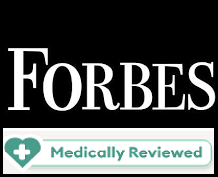Tagged: “Love”
Forbes: Forgiveness has “Immense Benefits”
Forbes Magazine is undeniably one of the most highly read news publications in the world. With 49 global editions licensed in 83 countries and printed in 28 languages, it reaches more than 140 million people worldwide on a monthly basis through direct subscription and its website.
Now the 105-year-old publication has teamed up with medical experts to tout the “immense benefits” of forgiveness on both mental and physical health in an article titled “Forgiveness: How to Forgive Yourself and Others.” It was published on Aug. 31, 2022, and received the coveted Forbes Health Advisory Board seal of approval.

“The benefits of forgiveness greatly outweigh holding a grudge, and can affect both mental and physical health in profound ways,” according to the article. “While forgiveness may feel impossible in certain circumstances, forgiveness experts—yes, this is a real field of study—say that forgiveness can be learned no matter how great the offense. Even if the person you have the hardest time forgiving is yourself, this too, they say, can be learned.”
The Forbes article relies extensively on the work of Dr. Robert Enright and calls him “a pioneer in the scientific study of forgiveness” and “a leading expert on forgiveness.” Dr. Enright is a professor of educational psychology at the University of Wisconsin-Madison and co-founder of the International Forgiveness Institute who last year was awarded the 2022 American Psychological Foundation Gold Medal Award for Impact in Psychology.
“As you can see, all the ways of practicing forgiveness as well as its benefits aren’t really about the person who wronged you; it’s about yourself,” according to the Forbes article. “Forgiveness isn’t easy, but it can be done. When you commit to putting it into practice, your mental and physical health will both be better for it.”
“Clearly forgiveness has immense benefits.”
Forbes Magazine
Here are the scientifically-demonstrated benefits of forgiveness cited in the article:
Mental Benefits of Practicing Forgiveness
- You experience less anxiety when you forgive
- Inability to forgive and depression can be linked
- You feel more hopeful and empowered when you forgive
- You’re less likely to hurt others
Physical Benefits of Practicing Forgiveness
- Forgiveness is good for your heart
- It’s associated with better sleep
- Forgiving supports the immune system
In addition to lauding the benefits of forgiveness, the article includes a helpful list of “10 Ways to Practice Forgiveness for Yourself and Others.”
Read the full Forbes Magazine article.
What advice can you offer to me about the following frustrating situation: I have forgiven my partner, offering compassion and empathy toward her. She was insensitive to me on several occasions when she was under deep stress at work. She is convinced that other people cannot know her own private world and so empathy, in her view, is unreachable. In other words, my words of empathy are hollow for her. What do you suggest that I do? I ask because she seems to think that true forgiveness, involving empathy, is impossible.
This is a very interesting situation. I say that because I have not encountered a situation like this until you brought it up. If she thinks that you cannot know her inner world, even though you are convinced that you are able to do this to a degree, then you might try a different approach. Instead of using words that suggest you have empathy for her inner world, try to focus instead on her behavior and circumstances, not to excuse her behavior but to put it in the context of her recent challenges when she hurt you. She should be able to see that you are able to concretely observe the behaviors and circumstance that increased her stress and likely contributed to her insensitive remarks. She then should be able to understand that you are viewing her as a valuable person who is more than the insensitivities she has shown to you.
You say that to forgive is to offer “moral love” to another person. What exactly is moral love? I don’t think I can reach that high with my partner at this point.
Moral love, or agape in the ancient Greek, is a deliberate caring for another person (or other persons) for that person’s own sake, for the good of the other. This sometimes can be difficult because it requires effort and persistence on your part. It is not doing something so that you get something in return, but done for the other person’s sake.
In your most recent response to me, you said that when my partner asks me to forgive and to just forget all about his behavior, he is asking me to acquiesce or just give in to his nonsense. If forgiveness is not acquiescence, then what, exactly is forgiveness?
Forgiveness is a moral virtue in which you willing choose to get rid of resentment toward an unjustly acting person and to offer as best you can goodness toward that person. The goodness can take the form of kindness, respect, generosity, and even moral love.
FORGIVENESS IS A GIFT
Over the past 20 years, Joe Daguanno has climbed the corporate ladder at the Mid-West Family of Companies to become Chief Profit Strategist – Partner. That means he is a media, branding, and advertising professional who excels at revenue generation. He’s also a pretty good, and consistent, blogger.
What’s up in the Cosmos? is the title of Daguanno’s personal blog that he has been writing for the past dozen years. His recent Dec. 20 blog post was titled “The Gift of Forgiveness.” Here’s a brief excerpt:

Joe Daguanno, Chief Profit Strategist – Partner, Mid-West Family of Companies
Forgiveness is a gift. It’s love. It’s generosity. It’s mercy.
As we give this gift, we heal.
Holding a grudge acts like a tourniquet to the flow of healing. It closes the heart and the wounds remain open.
Real forgiveness takes strength. It takes courage. It takes honesty. It takes time.
But it’s worth it.
So very much.
Daguanno’s depth of perception about forgiveness developed several years ago when he met Dr. Robert Enright, forgiveness research pioneer and founder of the International Forgiveness Institute (IFI). That encounter led Daguanno to spearhead development of a series of public service announcements that were broadcast hundreds of time on Wisconsin Public Radio and by numerous commercial radio stations throughout the Midwest—all at no cost to the IFI.
As his title references, Daguanno is a partner in Mid-West Family of Companies—an alliance of more than 40 radio stations covering 8 separate geographic markets–all assembled by the late Dr. William Walker and his son Thomas Walker. Dr. Walker co-founded the IFI along with Dr. Enright in 1995. Thomas Walker continues to provide the IFI with both financial and hands-on support through the Walker Family Trust.
Read Daguanno’s full Dec. 20 blog: “The Gift of Forgiveness.”



